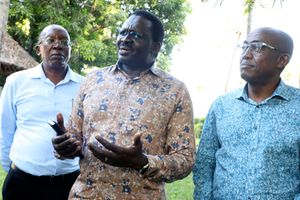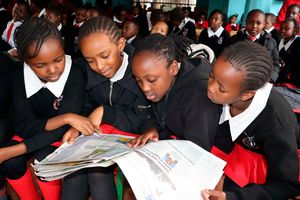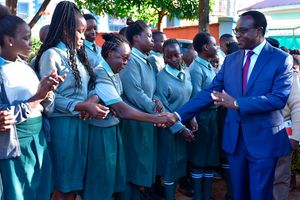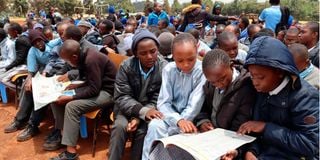
Learners at PCEA Kanjeru Primary School look at a model CBC KPSEA exam paper published in the Juniorspot pullout.
After enrolling her two sons to learn under the Competency-Based Curriculum (CBC) for six and seven years, Dr Lucy Riungu recently decided to transfer them to an international school.
Asked why, Dr Riungu says her decision was informed by the confusion arising from the transition to senior school.
“Most parents are not sure about what happens after senior school. Which universities will our children join after completing senior school? That has been a big battle in my home. After Grades 10, 11 and 12 what next?” she probed, urging the Ministry of Education to demystify senior schools, saying it was a big mystery.
She was among hundreds of parents who flocked to the International Schools Fair in Mombasa on Saturday to enquire about how to transfer from CBC to the international curriculum.
Most of the parents who spoke, some of them on condition of anonymity for privacy reasons, said CBC is still in the infancy stage and would need a lot of work to become better.
Quality teachers
Dr Riungu believes that international schooling will change her son's future and that her children would have continued learning under CBC if the state had improved the quality of teachers.
“Get quality teachers, verify them because if you want your child to excel…to be a doctor or whatever he or she aspires to be, you want the best teacher to teach your child to excel. I don’t have a problem with high grades, my issue is can a child excel in whatever she or he is doing? And that only comes from your tutor,” said the medic.
Dr Riungu said she is yet to grasp what lies ahead and how Grade 9 students will transition to senior school next year (2026).
“The quality of teachers is wanting. They are micromanaging children, a child is not allowed to be. You know with the Kenyan education syllabus, after Grade 9, you have to go to senior school, now, I have a problem with boarding schools and most good senior schools are boarding schools which are mostly national schools,” she said.
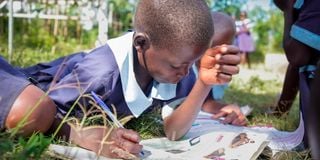
Pupils at Mboto Sunrise Primary School work on their competency-based curriculum assignment under a tree.
Before the transfers, her children were learning in an affluent private school in Mombasa.
“I have decided to transfer them to an international school because of the quality and programming of the teaching,” said Dr Riungu.
No clarity
Other parents who attended the fair echoed her beef with CBC, with many citing a lack of clarity.
“One time the ministry says mathematics is compulsory, the next day they clarify that it is not. Who is in charge of the education ministry? Is it President William Ruto, Cabinet Secretary Julius Migos or his Principal Secretary Dr Belio Kipsang?” asked a parent of a Grade 9 learner.
He wondered why Dr Ruto has been going around explaining what his administration is doing in the education sector yet there is a minister appointed to handle the docket.
“Have you gone to a public school in Tana River? CBC is only implemented in urban areas. We have shortages of teachers, no laboratories, children learning under trees then we claim that education is an equalizer?” added another parent.
The businessman told Nation.Africa he was contemplating taking his three children to an international-curriculum school.
Ms Sandra Akinyi from International Schools and Education Fairs-Africa explained that their aim was to sensitise parents on the essence of international education which gives children room to be able to expand their horizons and look at life from a broader perspective.
“International options equals more international opportunities in the long run,” said Ms Akinyi.
Last week, Dr Kipsang said it would not be compulsory for Grade 10 students to pursue science and mathematics subjects in senior school. However, all senior schools will be compelled to offer mathematics and science subjects.

Learners will have fewer subjects and lessons per day following recent review of CBC.
The Grade 9 learners in junior school will transition to senior schools next year based on the career pathways of their choice, abilities and interests.
Kenya has adopted three pathways in senior schools: Social Sciences, Arts and Sports, and Science Technology, Engineering and Mathematics (STEM).
“In Grade 10, it is not compulsory to do Mathematics and Sciences subjects. Because if you are not doing humanities, or sciences why would you be required to do mathematics?” asked the PS.
In an exclusive interview with Nation.Africa in Mombasa during the dialogues on education quality and learning outcomes since the introduction of the CBC nine years ago, Dr Kipsang said senior schools would be categorised according to the career pathways.
“I need to demystify this compulsory thing of mathematics, I do not know where it came from. The only thing that is compulsory to all schools is that STEM pathways should be offered by every school. But doing STEM pathways does not mean that children are forced to do STEM, it is only that it is available,” said the PS.
Aga Khan Academy Mombasa admissions officer Jackline Njogu said more parents had expressed their interest in international schools.
“We have seen more international schools coming up in Mombasa because a lot of parents are looking for quality education,” she added. She said a lot of parents are struggling to understand the Grade 9 transition.
During the rollout of Junior Schools in 2022, owners and stakeholders of private schools across the country through their Kenya Private Schools Association lamented over low enrolment after their learners joined international schools.
Some of the proprietors said they were grappling with financial challenges due to the low enrolment of pupils with parents preferring to take their children to either public or international schools.
Aga Khan Academy Mombasa head of academy Colin Webster said parents are choosing to send their children to international schools to get new, different experiences.
Brookhouse International School official Joseph Mutiso said the CBC curriculum is good but only needs to be polished.
“CBC is good. It is called experiential learning. You can touch, you feel and you can experience. It’s a very good curriculum. We just need to build on what is the end game for our children. So the exposure also needs to come into CBC and our children will be wholesome as we are building at Brookhouse,” said Mr Mutiso.


